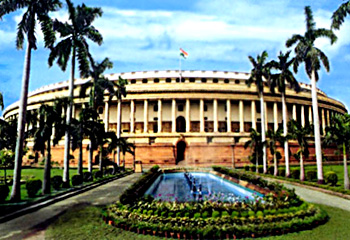 Parliament of India is a multi-functional institution performing a variety of roles that are inter-related and often meshing into one another.
Parliament of India is a multi-functional institution performing a variety of roles that are inter-related and often meshing into one another.
Some of the cardinal roles and functions of the Parliament may be described as follows:
•To form or end the Government
•To represent the Electorate
•To legislate
•To hold the government accountable for its actions
•To monitor the expenditure of public funds
•To be a forum for debate
•To be a forum for the expression of grievances
•To call for information
To Form or To End Government
The Indian Parliament, like all parliamentary democracies, forms the government. This is particularly due to the fusion of powers between the legislative and the executive branches of the Government. Members of Parliament, from the largest party in the Lok Sabha or of late from the largest coalition, form the Government at the centre.
At the same time if the ruling party loses the support of the majority of the members of the House, its Government goes. No grounds, arguments, proofs or justifications are necessary. When the House clearly and conclusively pronounces that the government of the day does not command its support, it must resign.
Representation of the Electorate
The primary function of the Parliament is to represent the people. It is the supreme forum through which people seek to realise their aspirations, urges and expectations. The Members of Parliament are the elected representatives of the people and they act as the chief communication channel between the people, Parliament and the Government. Multiplicity of political parties in Parliament represents the multi-cultural and plural society of India.
Legislation
The process of legislating, making laws is the most basic day-to-day function of parliament. Under Articles 245 and 246 Parliament can make laws for the whole or any part of India within its area of competence as defined and delimited under the distribution of legislative powers between the Union and the States vide the Seventh Schedule. In regard to the Union List, the Parliament`s jurisdiction is exclusive. Both the Union and the States have concurrent power to legislate in respect of entries in the concurrent list. In case of conflict between the Union and the State laws, the former prevails.
Parliament may by law change the name, the boundaries, area etc. of the States or establish new States, increase the number of judges of the Supreme Court or establish additional courts.
Governmental Accountability
Under our system, after a policy is laid down, a law is passed or money is sanctioned, it is the administration which is required to execute and implement. Since Parliament embodies the will of the people, it must be able to oversee the way in which public policy is carried out so as to ensure that it keeps in step with the objectives of socio-economic progress, efficient administration and aspirations of the people as a whole.
The various procedural devices like the system of Parliamentary Committees, Questions, Calling Attention Notices, Half-an-Hour discussions, etc. through which the Parliament gets informed, also constitute very potent instruments for effecting parliamentary surveillance over administrative action. Significant occasions for the review of administration are provided by the discussions on the Motion of Thanks on the President`s Address, the Budget demands, and particular aspects of governmental policy or situations. These apart, specific matters may be discussed through motions on matters of urgent public importance, private members` resolutions and other substantive motions.
Monitoring the Expenditure of Public Funds
Parliamentary control over public finance - the power to levy or modify taxes and the voting of supplies and grants - is one of the most important checks against the Executive assuming arbitrary powers. No taxes can be legally levied and no expenditure incurred from the public exchequer without specific parliamentary authorization by law (articles 114 116 and 265). The Constitution of India also provides for an annual statement of the estimated receipts and expenditure-budget-to be placed before Parliament. Other means by which Parliament exercises control over the public exchequer is through Public Accounts Committee, Committee on Public Undertakings, Estimates Committee and the Report of the Comptroller and Auditor General of India.
A Forum for Debate
During debate and discussion on legislative proposals or Finance Bills, motion to consider and approve government policies, motion of thanks on the President`s Address, Budget, etc. members are free to express themselves and to say what is good for the country and what modifications in the existing policy are required.
A Forum for Expression of Grievances
Parliament acts as a forum for ventilation of the grievances of the people, their difficulties and their passions, anxieties and frustrations. Various grievances, needs and aspirations of the people are discussed in the Parliament and necessary legislation is taken up in this regard. In recent decades, emphasis has shifted more and more representational and grievance ventilation role of the Parliament. It is the peoples` institution par excellence.
Informational Role
Information is vital to Parliament. It is the first essential requisite for effective discharge of any of its functions. To call for information is perhaps the greatest power of the Parliament. Parliament`s right to be informed is unlimited except that if divulging of certain information is likely to prejudice vital national interest or the security of the State, it may not be insisted upon. So far as the activities of the Government are concerned, it is the duty of the Government itself to feed the Parliament with information which is full, truthful, and precise and supplied in time.
Other Functions
Besides, Parliament exercises multifarious functions, for example, in matters like the amendment of the Constitution, the impeachment of the President, removal of Supreme Court and High Court judges, Comptroller and Auditor General, Chief Election Commissioner, Presiding Officers of the two Houses etc.




















